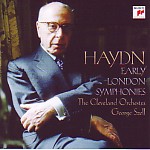Back from the wilderness of Sony’s Essential Classics series, and remastered in nice, clear stereo along with Bernstein’s set of Paris Symphonies for this same label, Szell’s recordings of the first six London Symphonies represent the ultimate in big-band Haydn. And late Haydn should always be played with a big band: his own ensemble in London numbered some 60 players in a room that held 800. In other words, for one of today’s typical concert halls he would have expected a full-sized, modern symphony orchestra, and that’s just what he gets here.
Of course this is Szell, so the size of the ensemble doesn’t entail any sacrifice of clarity. Indeed, these performances are miracles of balance and precision, but never at the expense of Haydn’s energy and humor. Consider the slow movement of Symphony No. 93, which features the most obscene bassoon belch in recorded history, or Szell’s uplifting handling of the minuets. The famous “Surprise” movement sounds like it was composed yesterday, and the symphony’s finale blazes with excitement. There are delights everywhere, from the amazingly detailed counterpoint in the finale of No. 95 to the Mozartean grace of No. 98’s slow movement. Just buy this while you can–it’s a true classic.
































